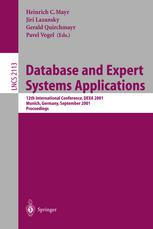

Most ebook files are in PDF format, so you can easily read them using various software such as Foxit Reader or directly on the Google Chrome browser.
Some ebook files are released by publishers in other formats such as .awz, .mobi, .epub, .fb2, etc. You may need to install specific software to read these formats on mobile/PC, such as Calibre.
Please read the tutorial at this link: https://ebookbell.com/faq
We offer FREE conversion to the popular formats you request; however, this may take some time. Therefore, right after payment, please email us, and we will try to provide the service as quickly as possible.
For some exceptional file formats or broken links (if any), please refrain from opening any disputes. Instead, email us first, and we will try to assist within a maximum of 6 hours.
EbookBell Team

4.1
90 reviewsth DEXA 2001, the 12 International Conference on Database and Expert Systems Applications was held on September 3–5, 2001, at the Technical University of Munich, Germany. The rapidly growing spectrum of database applications has led to the establishment of more specialized discussion platforms (DaWaK conference, EC Web conference, and DEXA workshop), which were all held in parallel with the DEXA conference in Munich. In your hands are the results of much effort, beginning with the preparation of the submitted papers. The papers then passed through the reviewing process, and the accepted papers were revised to final versions by their authors and arranged with the conference program. All this culminated in the conference itself. A total of 175 papers were submitted to this conference, and I would like to thank all the authors. They are the real base of the conference. The program committee and the supporting reviewers produced altogether 497 referee reports, on average of 2.84 reports per paper, and selected 93 papers for presentation. Comparing the weight or more precisely the number of papers devoted to particular topics at several recent DEXA conferences, an increase can be recognized in the areas of XMS databases, active databases, and multi and hypermedia efforts. The space devoted to the more classical topics such as information retrieval, distribution and Web aspects, and transaction, indexing and query aspects has remained more or less unchanged. Some decrease is visible for object orientation.